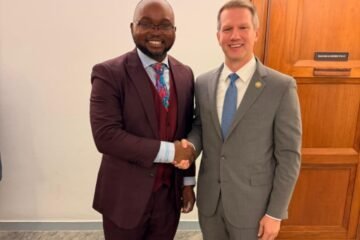The National Climate Change Act (2021) was hailed as a groundbreaking moment in Nigeria’s efforts to confront the harsh realities of climate change. It set the stage for the country to align itself with global climate action goals, including reducing greenhouse gas (GHG) emissions, building resilience, and fostering sustainable development. But here we are, more than two years since its passage, and the question must be asked: Why have only five states in the entire federation managed to create a GHG emissions inventory? Why is there such a glaring lack of capacity to domesticate this act across sub-national levels? And, most critically, what data are these states using to formulate their climate policies if they don’t have a proper understanding of their own emissions?
A Legislative Win Without Local Action
When the National Climate Change Act became law, it symbolized a shift towards accountability in Nigeria’s climate response. The act mandates that each state should not only create its own Climate Action Plan but should also develop a GHG emissions inventory—a basic, yet essential tool in measuring the scale of the problem and planning appropriate solutions. After all, you can’t manage what you can’t measure. Yet, only five states—just five—have developed this inventory.
This raises several disturbing questions about the capacity of sub-national governments to domesticate the act. What are the other states doing? Why the paralysis? Is it a lack of technical know-how, political will, or simply a disregard for the pressing nature of climate change?
The Ghost Data Behind Policy
Let’s get to the heart of the issue: Without a GHG inventory, what kind of data are these states using to inform their climate change policies? How do you develop a Climate Action Plan without knowing how much carbon your industries emit, how much methane is seeping from your waste dumps, or how much deforestation is erasing your natural carbon sinks?
This is not a hypothetical or academic issue. States without proper data are flying blind. They might be enacting policies that are either woefully inadequate or, worse, entirely irrelevant to the actual environmental challenges they face. When you don’t have the data, you’re left to guesswork—and guesswork is no foundation for tackling one of the most critical issues of our time.
So, are these states drafting policies on the back of napkins? Are they relying on outdated or borrowed data from other regions that don’t reflect their local realities? The absurdity of it all begs for an explanation, yet none seems forthcoming.
The GHG Inventory: More Than Just Numbers
A GHG emissions inventory is not merely a bureaucratic exercise; it is the cornerstone of effective climate action. It tells you where your emissions are coming from, how they’re changing over time, and, most importantly, where you need to focus your mitigation efforts.
Let’s break this down: Without a GHG inventory, you don’t know how much pollution your transportation sector is responsible for. You have no idea whether agriculture is a major contributor to emissions in your state, or how much deforestation is undoing years of progress. It’s like trying to run a marathon with your eyes closed. And yet, in a country of 36 states, only five have bothered to open their eyes.
The Illusion of Climate Action
There’s a lot of talk about “climate action” in Nigeria, particularly at the state level. States boast about tree-planting campaigns, renewable energy projects, and green initiatives. But all of these actions—however well-intentioned—are largely meaningless without a firm understanding of the emissions landscape.
How can you reduce your carbon footprint if you don’t know what your carbon footprint is? How can you prioritize your climate interventions if you don’t know what’s causing the most harm? It’s an illusion of climate action—an illusion that may appease the public in the short term but will do nothing to protect the future.
Lack of Capacity or Lack of Will?
To be fair, capacity-building at the sub-national level is not an overnight process. Many states lack the technical expertise, resources, and institutional frameworks to carry out the sophisticated work of developing a GHG inventory. But these are challenges that can be overcome with proper planning, investment, and collaboration. The federal government, international partners, and civil society have provided pathways to build this capacity. The real question is: Why aren’t more states taking these opportunities?
Could it be that the political will simply isn’t there? Are state governments more interested in maintaining the status quo than in rolling up their sleeves and confronting the difficult work of climate governance? The reality is that GHG inventories are hard work. They require coordination, data collection, and long-term commitment—all things that are often in short supply at the sub-national level.
The Stakes Are Too High
This is not just a technical issue. The failure to domesticate the National Climate Change Act at the state level has far-reaching consequences. Nigeria is one of the countries most vulnerable to the impacts of climate change—extreme weather events, rising sea levels, desertification, and food insecurity are already affecting millions. If states don’t have accurate data on their emissions and don’t take swift, decisive action to reduce them, the consequences will be catastrophic.
We’re not just talking about environmental degradation. We’re talking about the displacement of entire communities, the collapse of local economies, and a public health crisis brought on by worsening air and water quality. This is a matter of life and death for many Nigerians, and yet, the vast majority of states are treating it as an afterthought.
It’s time for a wake-up call. The National Climate Change Act was passed for a reason—it’s not just another piece of legislation to gather dust on the shelves of government offices. It is a blueprint for Nigeria’s survival in a world that is rapidly changing due to climate disruptions. States need to step up and take ownership of their role in this fight.
Developing a GHG emissions inventory is not optional—it is a mandatory first step. Without it, states are merely pretending to care about climate change. The federal government needs to hold states accountable. Civil society must demand transparency and real action. And state governments must prioritize this work before it’s too late.
The time for excuses is over. The time for action is now.
Prof CC Obuaku
Consultant to Osun State Government on Climate Change











